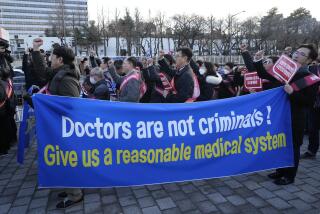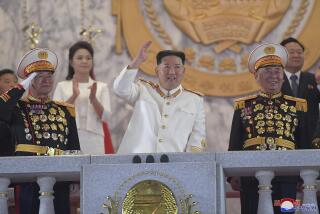Rallies, Clashes Recall 1980 Korean Uprising
- Share via
SEOUL, South Korea — Students demonstrated Friday throughout South Korea, often fighting with police, on the fifth anniversary of an uprising against martial law in which nearly 200 people were killed.
Sources said that 27 universities and colleges in the capital were involved, and that the most serious clash occurred at Seoul National University in the southern outskirts. Similar incidents were reported in provincial areas, including Kwangju, the southern city in which the 1980 uprising took place.
About 5,000 students battled 1,000 riot police in Kwangju for three hours, hurling stones, flaming torches and gasoline bombs, said the sources, who spoke on condition of anonymity. Police wearing helmets and heavy protective clothing responded with tear gas.
There were no immediate reports on injuries at Seoul National, but 10 students were reported hurt during a demonstration at a language school when a wall collapsed on them.
Other schools in Seoul at which demonstrations were reported included three more leading universities--Korea, Yonsei and Sungkyunkwan.
Before Black Coffin
About 1,000 students at Yonsei held a memorial service and rally in front of a black coffin.
The uprising five years ago in Kwangju, a provincial capital 175 miles south of Seoul, capped a period of political turbulence that followed the assassination of President Park Chung Hee in 1979. The violence began May 18, the day after an order extending martial law.
Troops crushed the uprising after nine days, and 189 people were killed, by official count.
Unofficial estimates put the total of dead higher. Student critics, political dissidents and human rights groups contend that the force used was excessive.
Opponents of President Chun Doo Hwan cite the Kwangju incident as one of the main reasons they deny the legitimacy of his government. Chun, a former army general, rose to power after the crackdown.
A main theme of recent demonstrations, and especially those on Friday, was a call for an investigation and clarification of what happened at Kwangju.
Pursuit of that goal is promised by a strong new opposition party supported by leading dissidents Kim Dae Jung and Kim Young Sam.
The New Korea Democratic Party was formed shortly before the elections last Feb. 12, and won 103 seats in the 276-member National Assembly, the single-house Parliament. Chun’s Democratic Justice Party maintained a comfortable control with 148 seats, but the new group has become a major political force.
More to Read
Sign up for Essential California
The most important California stories and recommendations in your inbox every morning.
You may occasionally receive promotional content from the Los Angeles Times.










